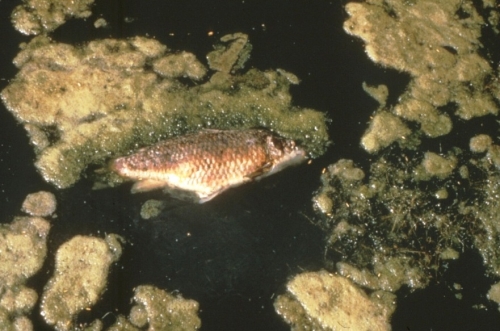Summer fish kills reported in Michigan inland lakes
Lakes with high phosphorus levels may be at higher risk for fish kills.
For Michigan anglers, reports of fish kills around the state this summer may come as yet another piece of distressing news on top of drought and crop losses. Michigan Department of Natural Resources (MDNR) Fish Division staff is tracking and monitoring fish kill reports.

Photo source: Michigan Department of Environmental Quality
The extended hot weather is warming up Michigan lakes – sometimes to temperatures that cannot be tolerated by certain fishes. To make matters worse, lakes experiencing heavy phosphorus loading from lawn fertilizer, septic systems and storm water runoff can produce overgrowths of rooted aquatic plants and algae. Both of these factors influence dissolved oxygen levels in the lake water column.
In lakes that strongly stratify, the waters above the thermocline may continue to mix and oxygenate, but also continue to warm. The warmer the water, the lower the dissolved oxygen concentrations. Below the thermocline, waters are usually cooler, but oxygen levels in deep dark waters are continually being depleted by plants and animals. (In the presence of sunlight, aquatic plants photosynthesize, adding oxygen to the water. In darkness they respire, removing oxygen from the water.) By late summer, some lakes become nearly devoid of oxygen in deep waters – again an intolerable situation for fish that can result in ‘summer kill.’
So what’s a fish to do? Most fish only tolerate fairly narrow ranges of water temperature AND dissolved oxygen. So moving back and forth between warm upper waters and cooler, less oxygenated, deep water is often not an option. According to the MDNR, fish species most prone to summer kill are pike, perch, suckers, bass, and bluegill living in shallow, productive lakes or bays with excessive amounts of algae or rooted aquatic vegetation.
The MDNR considers summer fish kill due to low oxygen a natural phenomenon associated with weather. It should be noted that local lake management strategies can exacerbate these conditions. Chemical treatment of aquatic plants and algae results in the accumulation of dead plant material at various depths. Naturally occurring bacteria, in the process of breaking down and biodegrading dead plant material, begin to multiply and increase their oxygen demand resulting in less oxygen for fish. Lake-wide chemical treatment of aquatic plants and algae, under hot summer conditions, can create even more stress on fish populations.
The MDNR asks that you report all fish kills via email to DNR-FISH-Report-Fish-Kills@michigan.gov . However, not all fish kills are the result of natural phenomena. If you suspect a fish kill is caused by a non-natural event, such as a pollutant spill, the MDNR asks that you call your nearest DNR location or Michigan's Pollution Emergency Alert System at (800) 292-4706.



 Print
Print Email
Email

